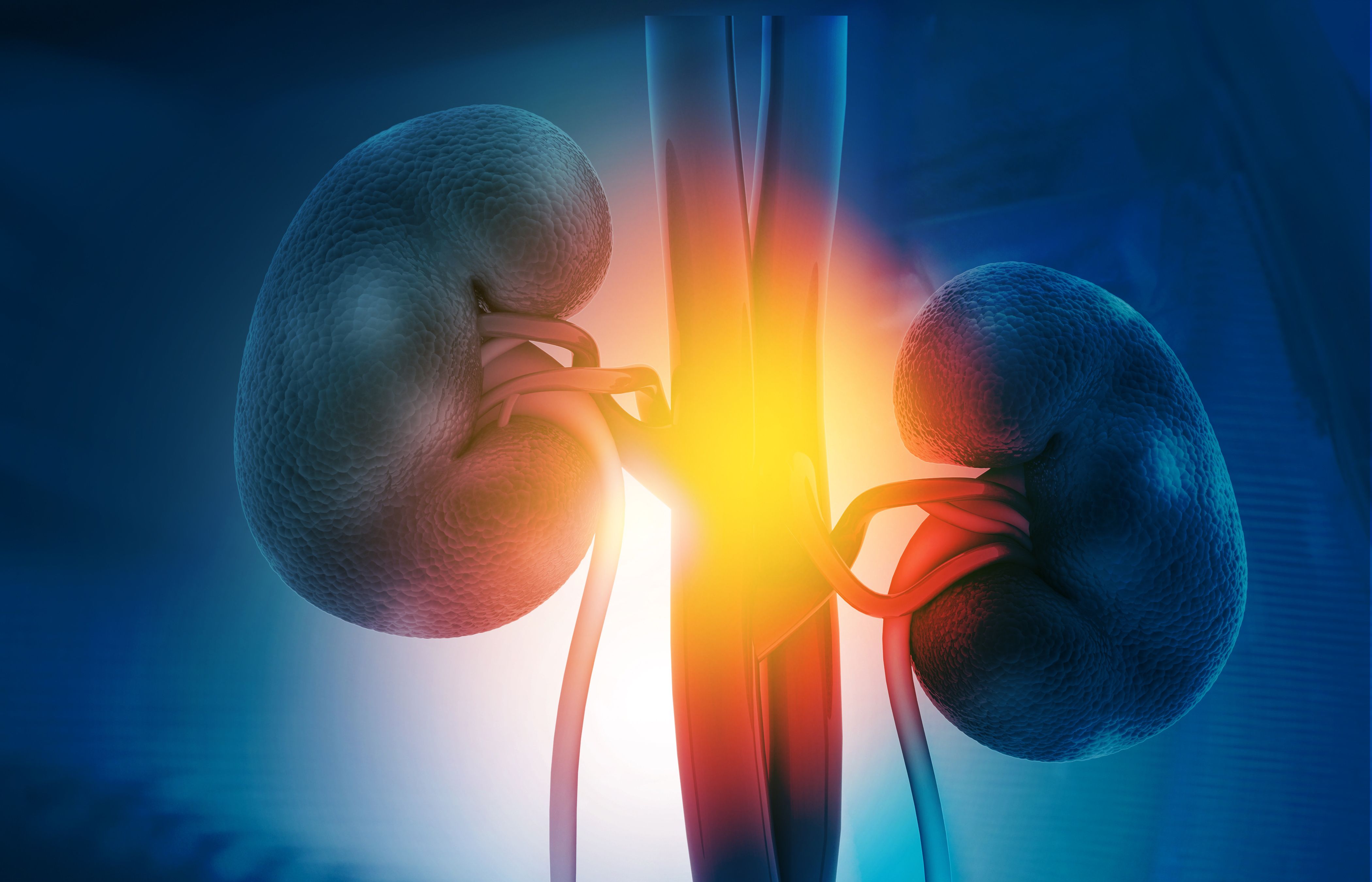SRS With Immunotherapy Extends Survival in RCC With Brain Metastasis
Combining stereotactic radiosurgery with immunotherapy significantly improves overall survival in patients with renal cell carcinoma and brain metastasis.
Human kidney on science background. 3D render: © Rasi - stock.adobe.com

Findings presented at the 2024 American Society of Clinical Oncology (ASCO) Annual Meeting showed that combining stereotactic radiosurgery (SRS) with immunotherapy significantly improves overall survival (OS) in patients with renal cell carcinoma (RCC) with brain metastasis.
According to Manmeet Ahluwalia, MD, MBA, FASCO, kidney cancer currently ranks as the fourth most common cancer to metastasize to the brain after lung cancer, breast cancer, and melanoma. While it is challenging to predict the exact proportion of patients with kidney cancer who will develop brain metastases, he estimates it to be approximately 10% to 15% of patients with stage IV disease.
A National Cancer Database analysis of treatment outcomes in patients with brain metastases from primary RCC sought to evaluate the impact of different treatment options, including combination therapies, for patients with RCC with brain metastases. According to Ahluwalia, what they found from this large national database is that patients who got radiosurgery and immunotherapy did the best.
“The overall survival in those patients with renal cell cancer and brain metastases was approximately 19 months, which fared better than 10 months or so that we saw either in those patients who received whole brain radiation or received immunotherapy alone, making radiosurgery in combination with immunotherapy a preferred way to treat these patients,” stated Ahluwalia, chief scientific officer, chief of medical oncology, deputy director, and Fernandez Family endowed chair in cancer research at the Baptist Health Miami Cancer Institute, in an interview with Targeted OncologyTM.
Manmeet Ahluwalia, MD, MBA, FASCO

Investigators analyzed the National Cancer Database (2004-2020) for patients with brain metastasis from RCC and categorized them by treatment type. This included either whole brain radiotherapy (WBRT) ± immunotherapy, SRS ± immunotherapy, and immunotherapy alone.
A total of 6446 patients diagnosed with brain metastases from RCC were included and in eligible cases, the median age of patients was 63 years (range, 19-90), with 69.2% of patients being male, 86.8% White, and 7.9% Black. A Charlson-Deyo score of 0 was seen in 68.3% of patients, and 44.6% had an unknown grade of the primary RCC. A total of 41.9% of patients had Medicare as primary payor, 27.7% had annual income >$74,063, and 79.3% were from metropolitan areas. Further, 39.6% of patients were treated at either an academic or research program.
A total of 427 (10.88%) patients were treated with SRS and immunotherapy, and they had an OS of 19.0 months. Comparatively, 1705 (43.44%) patients were given WBRT and had a median OS was 5.65 months, 987 (25.15%) patients who underwent SRS only had an OS of 9.7 months, 431 (10.98%) patients received immunotherapy only and had an OS of 12.9 months, and 375 (9.55%) patients underwent WBRT with immunotherapy and had an OS of 12.78 months (log-rank P <.001).
“This is also in alignment with what we have seen in other cancers, like lung cancer, where we are seeing the combination of immunotherapy and radiosurgery to be highly promising in patients with brain metastases,” added Ahluwalia.
Overall, these findings from the national database analysis show that combining SRS with immunotherapy significantly increases the OS in patients with RCC with brain metastases compared with immunotherapy, WBRT, or a combination of WRBT and immunotherapy. While promising, further prospective studies to confirm these findings are warranted.
“If we look at it mechanistically, combining radiosurgery with immunotherapy makes sense because when we give patients radiosurgery, it leads to a new epitope expression increase. It almost is like we use radiation as a vaccine sensitizer or immunotherapy sensitizer. That can help us further boost the immunotherapies immune response,” concluded Ahluwalia. “When we combine the 2, we are seeing better outcomes in these patients than with either immunotherapy alone or radiosurgery alone.”
REFERENCE:
Podder V, Ganiyani MA, Ahmad S, et al. Treatment outcomes of brain metastasis from primary renal cell carcinoma in United States: A National Cancer Database analysis. J Clin Oncol. 42, 2024 (suppl 16; abstr 4561). doi: 10.1200/JCO.2024.42.16_suppl.4561
Enhancing Precision in Immunotherapy: CD8 PET-Avidity in RCC
March 1st 2024In this episode of Emerging Experts, Peter Zang, MD, highlights research on baseline CD8 lymph node avidity with 89-Zr-crefmirlimab for the treatment of patients with metastatic renal cell carcinoma and response to immunotherapy.
Listen
Beyond the First-Line: Economides on Advancing Therapies in RCC
February 1st 2024In our 4th episode of Emerging Experts, Minas P. Economides, MD, unveils the challenges and opportunities for renal cell carcinoma treatment, focusing on the lack of therapies available in the second-line setting.
Listen